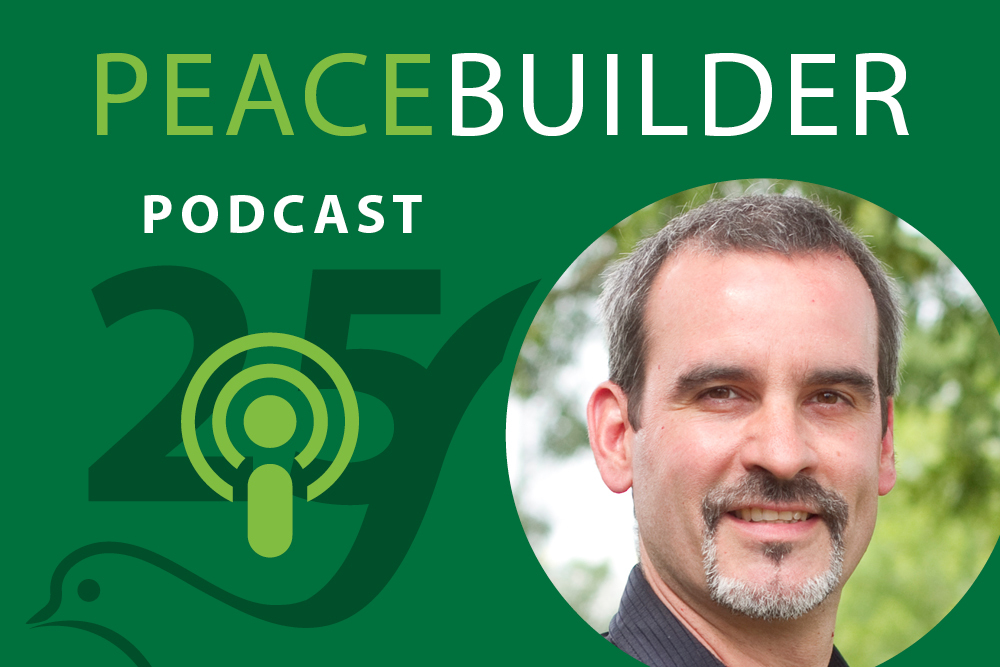The third episode of the Peacebuilder podcast features Center for Justice and Peacebuilding professor Carl Stauffer, who speaks on transitional justice from the perspective of growing up in the Vietnam War, to doing peace and justice work in South Africa, to confronting polarization in the United States today.
The podcast is just one of the ways the center is celebrating its 25-year anniversary. Hosted by CJP executive assistant and anniversary celebration committee chair Patience Kamau MA ‘17, the 10-episode series features faculty and staff members reflecting on the history of CJP and their own peacebuilding work. A new episode drops every other week on the Peacebuilder website.
Stauffer’s parents were doing church and development work in Vietnam when the war broke out. They decided to stay, and Stauffer was born there in 1964.
“That has affected my life and work significantly,” Stauffer said. He remembers one night that the fighting came within a half mile of their home in Saigon, “climbing under the bed with my mother and singing and praying, and the house shaking.”
Following in his parents’ footsteps, he and his wife, Carolyn Stauffer, joined the Mennonite Central Committee in South Africa in the “historic” moment of 1994 – only months before Nelson Mandela was elected. It was from South Africa that Stauffer completed his master’s degree at CJP, known then as the Conflict Transformation Program. After 16 years in South Africa, Carl joined the CJP faculty [Carolyn is also a faculty member at EMU and has worked with CJP programs].
In recounting his experiences through the episode, Stauffer weaves a story of the development of transitional justice, which he defines as an umbrella term that came about in the 1990s which describes structures and processes that are built to contain violence while a country moves from war to peace.
In 2007, Stauffer’s commitment to transitional justice blossomed in a refugee camp in Sierra Leone, where he supported a “justice movement from the grassroots” that implemented indigenous ways of addressing conflict on a macro level.
Today, Stauffer says, we have a “steep learning curve” to apply these concepts and practices to our own society in the U.S.
“Issues of healing, forgiveness, and reconciliation remain really divisive concepts right now in the polarization of our current political setting,” Stauffer said. But throughout all of the difficult work he’s done, and the violence he’s seen in the world, Stauffer retains hope.
“My interpretation, which is Anabaptist, is that Christ’s teaching and Christ’s way of living was not something just for us to imagine, but for us to do,” he explained.

Nice article.
What exactly is being done by the CJP program to combat Fascism and its growth in America? What exactly is the CJP staff promoting as a non-violent method to stand with immigrants, against continued incarceration of black and brown bodies and flagrant disregard of Climate Change?
I will listen to the podcast asap to see if my questions were adequately addressed.
Hope all is well with everyone.
Hi, Patty!
Great to hear from you. I hope we see you at the 25th Anniversary celebration.
As you know, our classroom conversations are largely shaped by what students are bringing into the learning community. The issues you mention are certainly being dealt with in a variety of ways. We have added some courses in SPI over the past few years — including this year — that address some of these questions. https://emu.edu/spi/courses/
Personally, I think that CJP has a special opportunity to bring wisdom from our colleagues who have been dealing with these problems into our conversations about what we in the United States can/should be doing. For example, we could learn a lot from our friends from Kenya, Iraq, and Afghanistan about how to anticipate, plan for and work against election violence.
We are an educational program, so our practice work is largely what the faculty and staff do on their own time and what our students do as part of their studies. As a program, we are able to support others who are taking more direct action by providing training and educational support services. Our STAR (Strategies for Trauma Awareness and Resilience) program has been used by communities dealing with disasters driven by climate change.
EMU now hosts the Center for Sustainable Climate Solutions (CSCS) https://emu.edu/now/news/category/cscs/ and we are in conversation with them about how to bring the issues of climate change and the related conflict and violence problems more fully into our educational programs.
There is always more to be done, of course. If you have ideas for how CJP would be working on these issues, I would love to hear more.